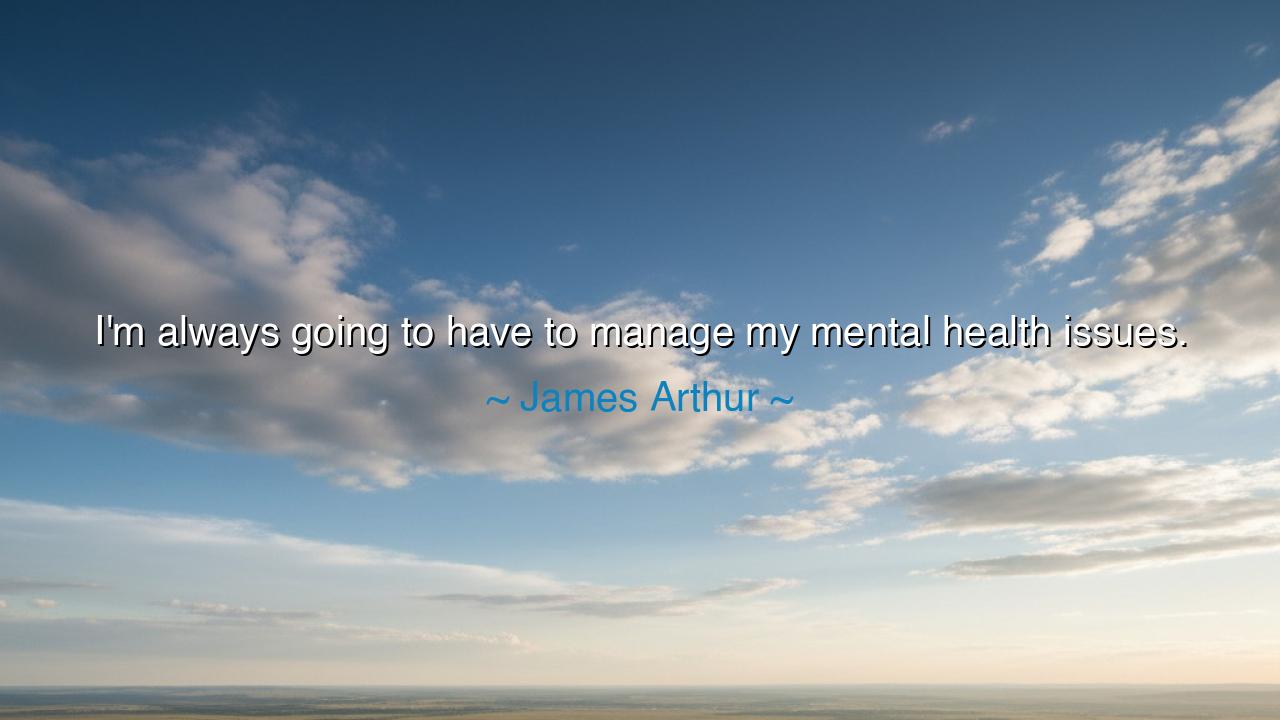
I'm always going to have to manage my mental health issues.






In the solemn truth of James Arthur’s words — “I’m always going to have to manage my mental health issues.” — there echoes a timeless confession of the human soul. It is the voice of one who has looked into the depths of his own mind and has not turned away. These words are not born of despair, but of wisdom — the wisdom that comes from understanding that the battle within does not end with victory, but with vigilance. They remind us that healing is not a destination, but a sacred journey, one that we must walk with humility, courage, and grace, through every season of life.
The ancients spoke often of balance — the harmony between mind, body, and spirit. They believed that when one fell out of alignment, the others would tremble in kind. James Arthur’s truth is a reflection of that ancient understanding: the mind, once wounded, does not simply forget. It must be tended like a garden — with patience, with care, and with reverence. The weeds of anxiety, sorrow, and self-doubt will try to return, but the gardener does not curse the soil for it. Instead, he returns again and again, pruning, watering, and nurturing. So too must we tend to our own inner landscape, for it is the ground upon which all our thoughts and hopes are born.
Think of Vincent van Gogh, the painter whose colors sang with fire even as his heart wrestled with shadows. His art was a cry and a prayer — an act of both suffering and redemption. Van Gogh knew, as James Arthur knows, that mental health is not a foe to be slain once and for all, but a force to be understood and guided. Though the storms of his mind never ceased entirely, through art he found a measure of peace, a way to give shape to his turmoil and transform pain into beauty. His life teaches us that though the struggle may endure, so too does the capacity for creation, meaning, and love.
To “manage” one’s mental health, as Arthur declares, is not a sign of weakness — it is an act of ongoing bravery. For the warrior who returns to the battlefield each day, knowing the fight will never fully end, is braver than the one who battles only once. It is the acceptance that life is not a straight path of healing but a cycle — of falling and rising, of breaking and rebuilding. This acceptance, hard-won and humble, is the very heart of endurance. It transforms suffering into strength and weakness into wisdom.
There is great dignity in such honesty. To admit the need for management, for care, for vigilance, is to stand in truth when the world demands illusion. Many will hide their pain behind smiles, fearing judgment. But the soul that dares to speak its truth opens a door for others to do the same. In Arthur’s words, countless others may find solace — a reminder that they are not alone, that to struggle does not mean to fail, and that to keep managing one’s mind is to keep walking toward the light, no matter how often the darkness returns.
The lesson here is clear and enduring: acceptance is not surrender. To accept one’s mental health challenges is to claim ownership over them — to say, “This is part of me, but it does not define me.” Just as one tends to the body through food and rest, so must the mind be nourished through reflection, compassion, and discipline. Seek connection rather than isolation. Speak rather than silence yourself. Rest when weary, and rise when ready. The strength lies not in pretending to be unbreakable, but in continuing to mend yourself with patience.
And so, my listener, take this wisdom into your own heart: life will not always grant you peace, but it will always grant you the chance to pursue it. Mental health, like the tide, will ebb and flow. Do not curse the changing sea — learn to sail upon it. Guard your mind as you would a sacred flame, tending it with gentle hands and unwavering faith. For as James Arthur teaches us, the journey of the soul is not about conquering our struggles once and for all, but about learning to live nobly alongside them — to rise each day, steady and aware, and to keep walking, always, toward the dawn.






AAdministratorAdministrator
Welcome, honored guests. Please leave a comment, we will respond soon